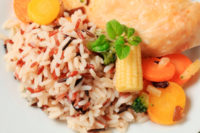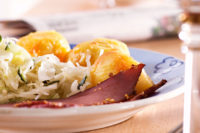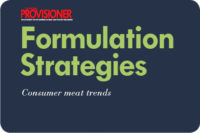Breakfast cereals are the most popular breakfast item in the U.S. and Canada, the UK and Ireland, and Australasia, but nowadays are also widely consumed in Europe. Nonetheless, a so-called continental breakfast of bread and bakery products, sometimes with cold meats and cheeses, is still more commonplace in many regions of Europe. Most Latin American, Asian and African breakfasts are still not Western-style.
Some countries, such as Australia, the U.S. and the UK have nearly universal household penetration of breakfast cereals, and this type of product now tends to dominate the breakfast market, particularly on weekdays, when speed and convenience is a key issue first thing in the morning.
In the UK, the popularity of the traditional cooked breakfast fry-up of eggs, bacon, sausage, tomato, mushrooms, baked beans, etc., has declined in recent years, reflecting lack of time, greater levels of health concern and the move toward lighter meals. However, it remains alive and well as an occasional or regular indulgent weekend option for many consumers. There have been relatively few product initiatives to date in terms of more convenient cooked breakfasts, although the appearance of savory toaster pastries in Europe over the past few years has been one significant move in that direction.
These were first launched in Germany as a frozen meat snack under the Tillman’s Toasty name from Europe’s largest privately owned slaughtering and meat-processing company, Tönnies.
Initially launched as the first meat-based toaster pastry, Tillman’s Toasty soon encompassed bacon, poultry, fish and vegetable options, and has sales valued at 30 million Euros a year. It then targeted the breakfast market more directly with the September 2010 introduction of Frühstücks-Toasty Schinken und Ei (Breakfast Toasty Bacon and Egg).
At virtually the same time, it launched a similar product in the UK market under the “Toast Me Bacon and Egg Breakfast” name, alongside a poultry variant under the “Toast Me Chicken” name. This was subsequently extended in the UK with five new variants, including Toast Me Cheese & Ham and Toast Me Hash Browns, suitable for breakfast consumption, alongside Chicken Curry, Chilli Chicken and Vegetable options that have more of an anytime snack or meal positioning.
The move to hand-held breakfast items evident in the U.S. is also apparent in the UK, albeit in a much more fragmented way. As well as standard ready meals, such as the All Day Big Breakfast frozen ready meal from Kershaws, the frozen and chilled foods market encompasses a range of breakfast sandwiches, muffins, wraps and baguettes, containing fillings with ingredients such as sausages, eggs and bacon. Recent introductions include an All Day Breakfast Baguette from Eatwell’s under the Feasters brand, featuring Microvent technology to allow them to be heated in the microwave in their packets. UK frozen-foods retail chain Iceland also has introduced frozen Sausage & Egg Muffins and Big Breakfast Baguettes.
There are even canned breakfast meal options, led by Crosse & Blackwell’s Hunger Breaks All Day Breakfast, made up of baked beans with added breakfast-style ingredients such as sausages, bacon, mushrooms and egg.
The ubiquitous British pie has also been moved into the breakfast arena with the September 2011 extension of the Pieminister brand with two breakfast variants — Full English Breakfast Pie and Morning Glory Pie, both featuring promotions linked to the Rugby World Cup and targeting rugby fans rising early in the UK to watch the matches from New Zealand. The Full English Breakfast contains baked beans, sausage, smoked Cheddar and smoked bacon, while the Morning Glory variant has baked beans, button mushrooms and smoked Cheddar.
In the meantime, there have also been some efforts to position existing breakfast standards, such as sausage, with a stronger breakfast association, as evidenced by Kerry Group’s early 2011 launch of Wall’s Breakfast Sausages, aimed specifically at the breakfast market with a thinner and lighter format than the rest of the Wall’s range, designed as a lighter choice for the breakfast period.
With per capita consumption of breakfast cereals in the U.S. lower than that in the UK, at just over 4 kg compared to nearly 7 kg, respectively, there is also a greater demand for other breakfast items, including protein-based products, such as hot and cold meats and eggs.
A significant market for frozen breakfast products has developed, with the major focus in recent years being on developing microwaveable options for rapid defrosting and heating, increasing the convenience of the products and their suitability as quick and sustaining breakfast lines. Interest in hand-held options is also rising, reflecting their popularity in terms of ease of eating “on the go.”
A review of recent launch activity recorded on the Innova Database reveals that the hand-held sector now encompasses a wide range of options, including sandwiches, baguettes, muffins, wraps and even burritos, all filled with breakfast-type ingredients. Burrito-based breakfast options have proved particularly popular in terms of launch activity over the last few months, with both branded and private-label introductions.
The José Olé range of frozen Mexican foods was extended in early 2011 with the launch of three Breakfast Burrito products in Egg & Bacon, Egg & Sausage and Egg & Ham variants, while on the private-label front, introductions have included Breakfast Burritos from speciality grocery retailer Trader Joe, launched mid-year just after its Breakfast Scramble range. Other U.S. own-brand activity in frozen breakfast lines has included Kroger’s English Muffin Sandwich in a Lite Canadian Bacon, Egg & Cheese variant.
The breakfast sector now even encompasses some pizza products targeted at the breakfast market, as exemplified by Palermo’s Breakfast Pizza, launched in mid-2011 featuring a cheese sauce, egg, bacon and sausage topping.
Concerns over health have led to the appearance of an increasing number of healthier breakfast options, with Heinz Weight Watchers Smart Ones a leader in this area. In March 2011, it extended its Morning Express frozen breakfast sub-brand, which offers an assortment of balanced breakfast options, including quesadillas, stuffed sandwiches, English muffin sandwiches and cheesy scrambles. The new additions, both featuring protein and whole grains, were an Egg, Sausage and Cheese Morning Wrap, and French Toast with Turkey Sausage, featuring six and seven WeightWatchers PointsPlus values, respectively.
Sara Lee’s Jimmy Dean breakfast foods range has also been developing its light options under the D’Lights low-calorie branding. The Ham Breakfast Bowl added in the spring of 2011 joined the existing D’Lights Bowls and Sandwiches range featuring Turkey Sausage Croissant, Turkey Sausage Whole Grain Bagel, Turkey Sausage Breakfast Bowl, Canadian Bacon Honey Wheat Muffin and Turkey Sausage Muffin.
Jimmy Dean is the long-term leader in the U.S. breakfast sausage market, but has gradually extended its range through bacon and breakfast sandwiches to encompass a wide range of breakfast lines, including skillets, omelettes and bowls, as well as its Hearty Sausage Crumbles range launched at the end of 2010. The Crumbles are fully cooked, packaged in resealable pouches and can be heated in minutes to offer consumers a new way to add sausage to their favorite breakfast dishes. Another relatively recent addition is the Jimmy D’s range of three child-oriented breakfast items — French Toast Griddles, Griddle Sticks and Pancake Griddles.
The importance of branding in the sector is also reflected in the appearance of restaurant brands in the retail market, with a mid-2011 introduction featuring a range of frozen breakfast foods launched by Golden County Foods using the iconic pancake house brand IHOP. The range featured Omelet Crisper in Cheese, Sausage & Cheese or Bacon & Cheese varieties, French Toast Stuffed Pastries, and Griddle’n’Sausage Wrap. A Starbucks branded Veggie, Egg & Monterey Jack Artisan Breakfast Sandwich was also launched in the U.S. market in early 2011, while the Tim Horton’s branding was used for the launch of Homestyle Hash and Bagel B.E.L.T (bacon, egg, lettuce and tomato) breakfast products at the end of 2010.
Nutritionists frequently refer to breakfast as the most important meal of the day, citing studies that find that people who skip breakfast are disproportionately likely to have problems with concentration, metabolism and weight. Even so, there are large numbers of people who still skip breakfast on a regular or occasional basis, most often citing lack of time or lack of appetite.
Even if these consumers can be encouraged to consume breakfast more often, ready-to-eat products such as breakfast cereals, cereal bars and bakery lines are likely to continue to dominate the market, reflecting their greater convenience. Nonetheless, there is always going to be demand, if on a more limited scale, for more substantial hot breakfast items in countries such as the U.S. and the UK, both for in-home and on-the-go consumption, with hand-held, microwaveable lines likely to see the most activity as a result of their greater relative convenience, portability and suitability for today’s busy lifestyles.






Report Abusive Comment